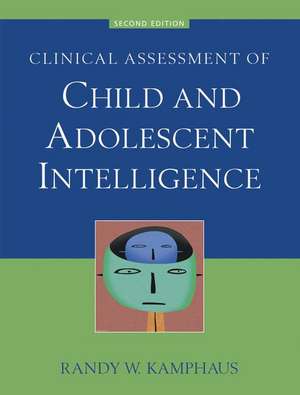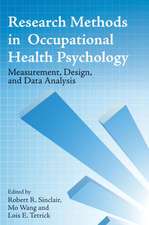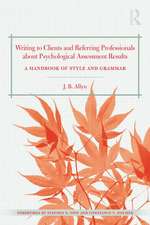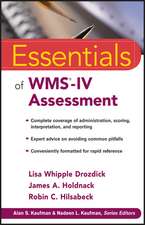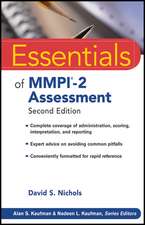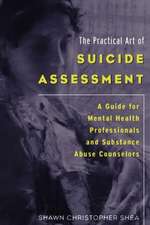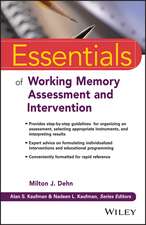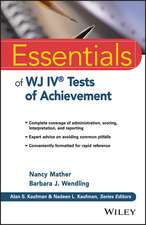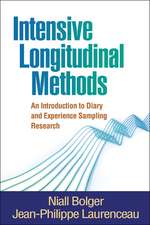Clinical Assessment of Child and Adolescent Intelligence
Autor Randy W. Kamphausen Limba Engleză Paperback – 16 aug 2005
In addition, Clinical Assessment of Child and Adolescent Intelligence:
- Stresses the importance of the interpretive process over the value of specific tests
- Fosters a deeper understanding of the intelligence construct
- Emphasizes learning by example, using valuable case studies and vignettes designed to provide students with concrete models to emulate
This edition covers all facets of intelligence testing, including detailed explanations of test interpretation, theory, research, and the full-range of testing options for preschoolers through adult clients. New chapters have been introduced on neuropsychological approaches, adolescent and adult intelligence, including coverage of WAIS-III and KAIT, and achievement and intelligence screeners have been added. And although designed primarily as a text for beginning graduate students, the book is also useful as a "refresher" for clinicians who are looking for updated assessment information.
Preț: 420.46 lei
Nou
Puncte Express: 631
Preț estimativ în valută:
80.45€ • 84.00$ • 66.59£
80.45€ • 84.00$ • 66.59£
Carte tipărită la comandă
Livrare economică 05-19 aprilie
Preluare comenzi: 021 569.72.76
Specificații
ISBN-13: 9780387262994
ISBN-10: 0387262997
Pagini: 692
Ilustrații: XI, 676 p.
Dimensiuni: 178 x 254 x 35 mm
Greutate: 1.18 kg
Ediția:2nd ed. 2001
Editura: Springer Us
Colecția Springer
Locul publicării:New York, NY, United States
ISBN-10: 0387262997
Pagini: 692
Ilustrații: XI, 676 p.
Dimensiuni: 178 x 254 x 35 mm
Greutate: 1.18 kg
Ediția:2nd ed. 2001
Editura: Springer Us
Colecția Springer
Locul publicării:New York, NY, United States
Public țintă
Professional/practitionerCuprins
History.- Theory.- Research Findings.- The Assessment Process.- Pscyhometric Principles and Issues.- Culture and Bias.- Practice Standards and Ethics.- The Wechsler Intelligence Scale for Children Third Edition (WISC-III).- Standford-Binet Fourth Edition.- Kaufman Assessment Battery for Children (K-ABC).- Assessment of Adolescent and Adult Intelligence.- Woodcock-Johnson Tests of Cognitive Ability (W-J).- Differential Ability Scales (DAS).- Achievement and Intelligence Screeners.- Infant and Preschool Methods.- Nonverbal Tests.- Modern Interpretation Methods.- Report Writing and Oral Reporting.- Neuropsychological Assessment and Intellectual Function in Children.- Mental Retardation and Learning Disabilities.- Appendix A.
Notă biografică
Randy W. Kamphaus is a Professor of Educational Psychology at the University of Georgia. In addition to classroom work, he has served in roles such as the Director of Training for the doctoral program in School Psychology, the Director of the School Psychology Clinic, and as the Faculty Administrator for Research in the College of Education.
A focus on issues related to clinical assessment has led Dr. Kamphaus to pursue research in classification methods, differential diagnosis, test development and learning disability and ADHD assessment. He has served as principal investigator, coinvestigator, or consultant on several federally funded research projects dealing with early intervention and prevention, child classification methods, prevalence of ADHD and Conduct Disorder in Latin America, and violence prevention in schools.
As a licensed psychologist and a Fellow of the American Psychological Association (APA), he has contributed extensively to his profession, and he is Past-President of the Division of School Psychology for APA. Dr. Kamphaus has also authored or coauthored 5 books, 2 psychological tests, more than 40 scientific journal articles, and more than 20 book chapters. He also participates in scholarship in the field through work as an editorial board member, associate editor, test reviewer, and newsletter editor. Dr. Kamphaus is a frequent guest lecturer and speaker.
A focus on issues related to clinical assessment has led Dr. Kamphaus to pursue research in classification methods, differential diagnosis, test development and learning disability and ADHD assessment. He has served as principal investigator, coinvestigator, or consultant on several federally funded research projects dealing with early intervention and prevention, child classification methods, prevalence of ADHD and Conduct Disorder in Latin America, and violence prevention in schools.
As a licensed psychologist and a Fellow of the American Psychological Association (APA), he has contributed extensively to his profession, and he is Past-President of the Division of School Psychology for APA. Dr. Kamphaus has also authored or coauthored 5 books, 2 psychological tests, more than 40 scientific journal articles, and more than 20 book chapters. He also participates in scholarship in the field through work as an editorial board member, associate editor, test reviewer, and newsletter editor. Dr. Kamphaus is a frequent guest lecturer and speaker.
Textul de pe ultima copertă
This volume – now in its second edition – has been completely updated to provide the most comprehensive and accessible handbook of practices and tools for the clinical assessment of child and adolescent intelligence. Designed specifically as a teaching tool, it provides students with an accessible guide to interpretation and applies the same interpretive systems across many tests. It emphasizes the proper interpretation of intelligence tests within the context of a child’s life circumstances and includes several devices to enhance the logical processes of assessment, beginning with test selection and concluding with the reporting of results.
In addition, Clinical Assessment of Child and Adolescent Intelligence:
- Stresses the importance of the interpretive process over the value of specific tests.
- Fosters a deeper understanding of the intelligence construct.
- Emphasizes learning by example, using valuable case studies and vignettes designed to provide students with concrete models to emulate.
This edition covers all facets of intelligence testing, including detailed explanations of test interpretation, theory, research, and the full-range of testing options for preschoolers through adult clients. New chapters have been introduced on neuropsychological approaches, adolescent and adult intelligence, including coverage of WAIS-III and KAIT, and achievement and intelligence screeners have been added. And although designed primarily as a text for beginning graduate students, the book is also useful as a "refresher" for clinicians who are looking for updated assessment information.
In addition, Clinical Assessment of Child and Adolescent Intelligence:
- Stresses the importance of the interpretive process over the value of specific tests.
- Fosters a deeper understanding of the intelligence construct.
- Emphasizes learning by example, using valuable case studies and vignettes designed to provide students with concrete models to emulate.
This edition covers all facets of intelligence testing, including detailed explanations of test interpretation, theory, research, and the full-range of testing options for preschoolers through adult clients. New chapters have been introduced on neuropsychological approaches, adolescent and adult intelligence, including coverage of WAIS-III and KAIT, and achievement and intelligence screeners have been added. And although designed primarily as a text for beginning graduate students, the book is also useful as a "refresher" for clinicians who are looking for updated assessment information.
Caracteristici
Specifically designed as a textbook for use in training psychology graduate students in the elementary principles of assessment and diagnostic practice with children and adolescents Applies the same interpretive systems across many tests (as opposed to most assessment textbooks that focus on only one measure) It is meant to be a teaching text, not a resource or reference text—it is designed to provide students with an accessible guide to interpretation This book emphasizes the proper interpretation of intelligence tests in the context of a child’s life circumstances Includes several devices to enhance the logical processes of assessment, beginning with test selection and concluding with the reporting of results Stresses the importance of the interpretive process over the value of specific tests Fosters a deeper understanding of the intelligence construct Emphasizes learning by example—beginning graduate students crave opportunities to see tests administered and to review sample reports; therefore, this test includes numerous cases to provide students with concrete models to emulate Although designed primarily as a text for beginning graduate students, the book is also useful as a "refresher" for clinicians who are looking for update assessment information; it may also serve as a companion text in assessment courses
